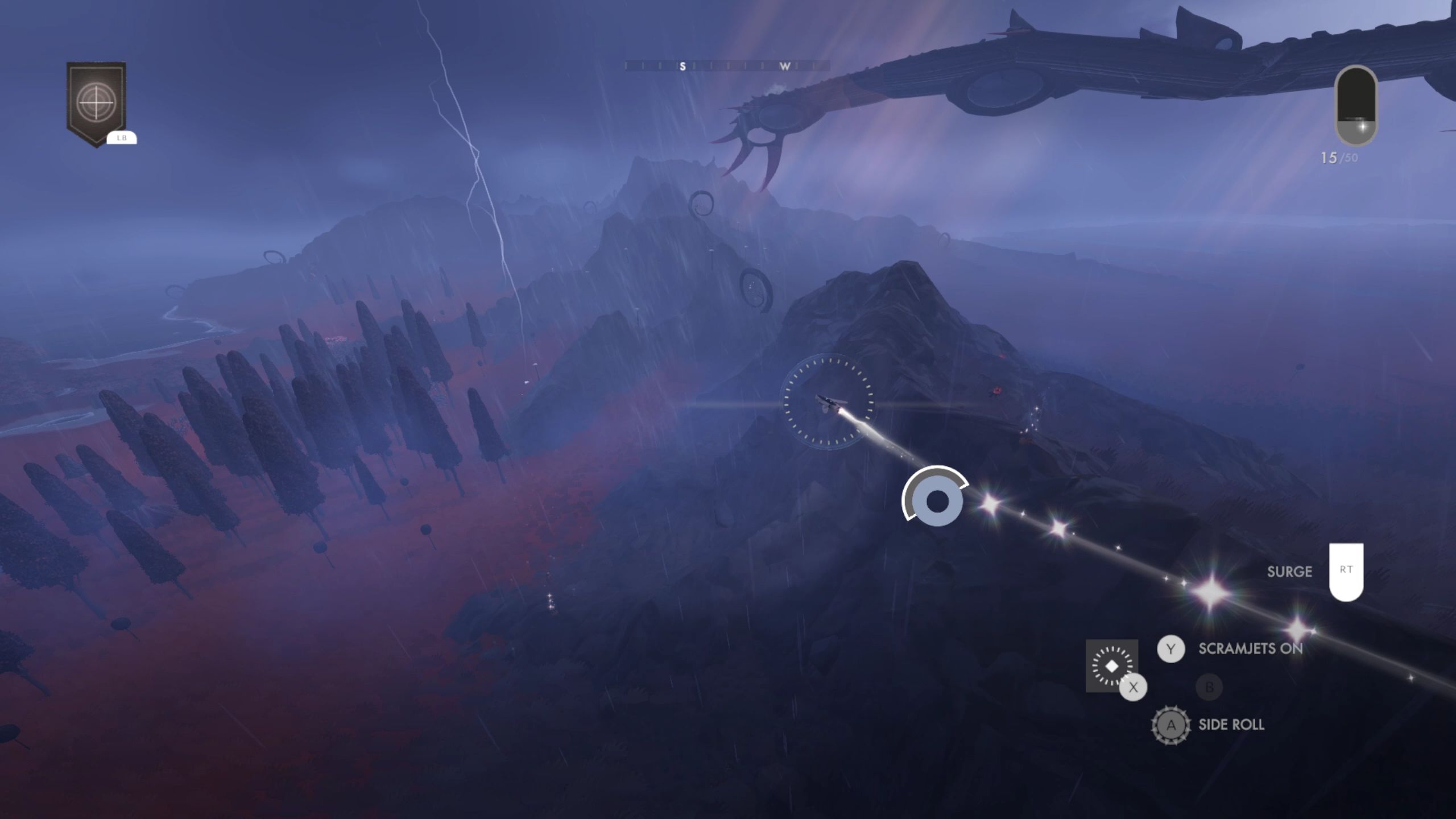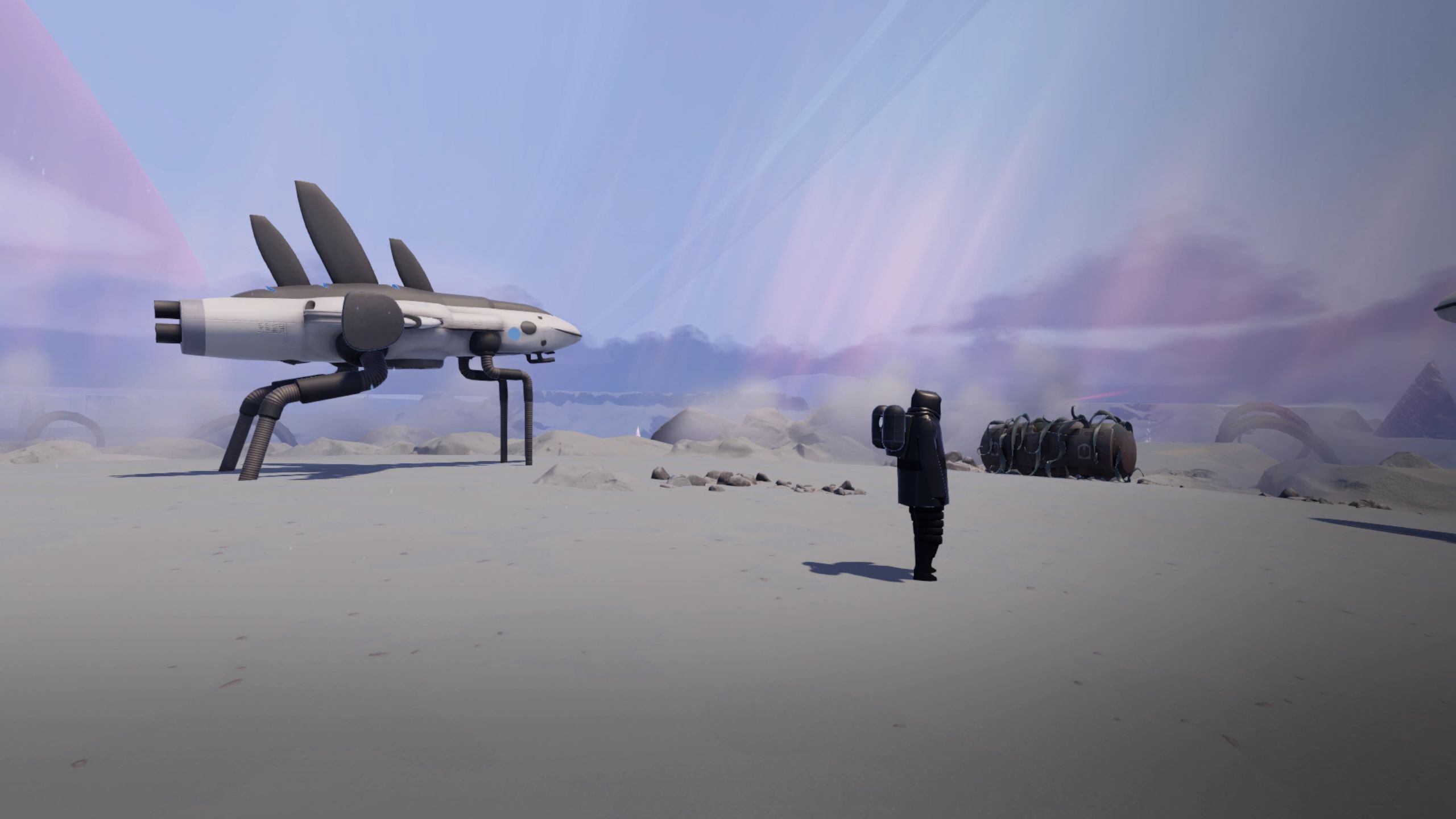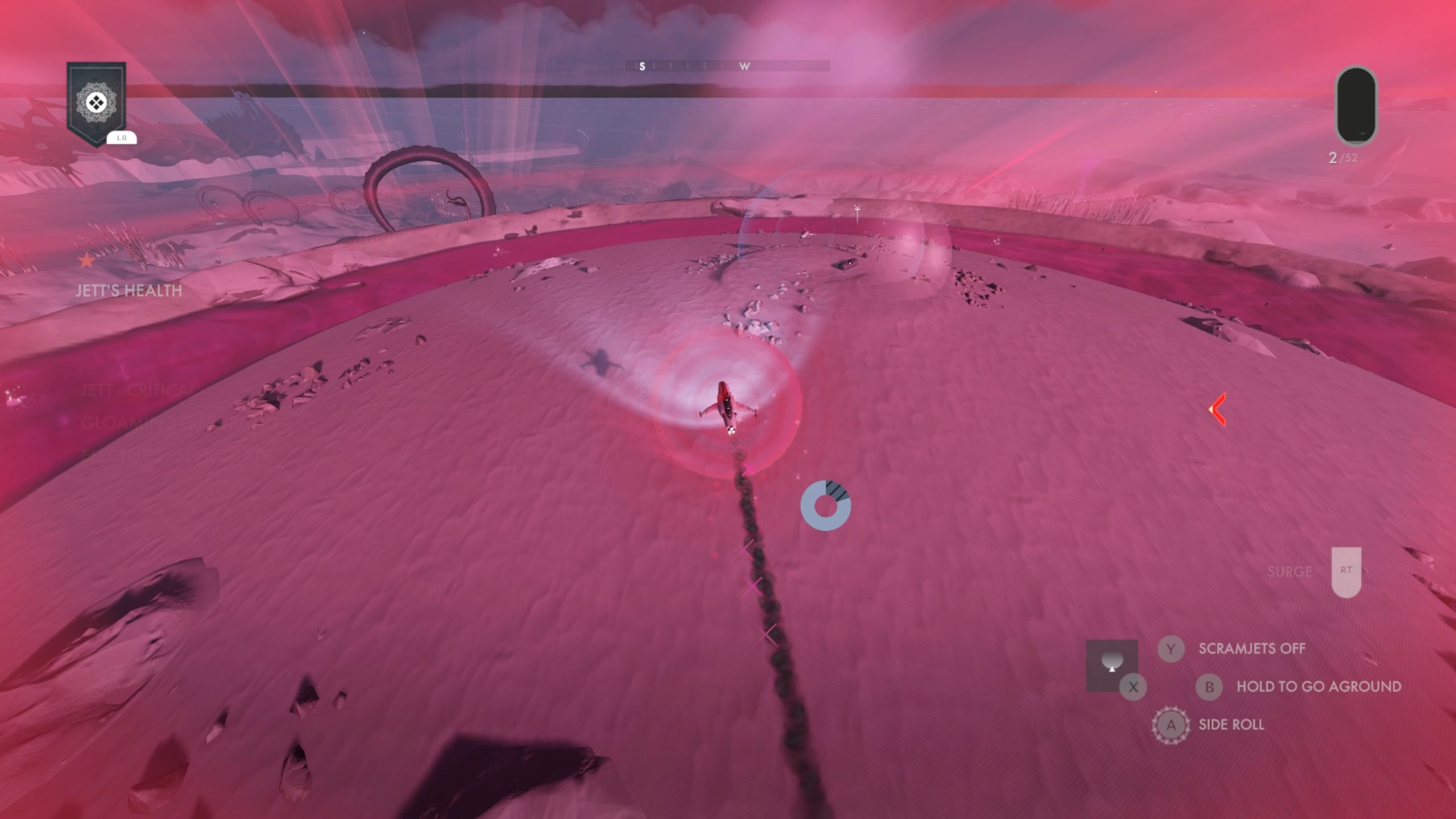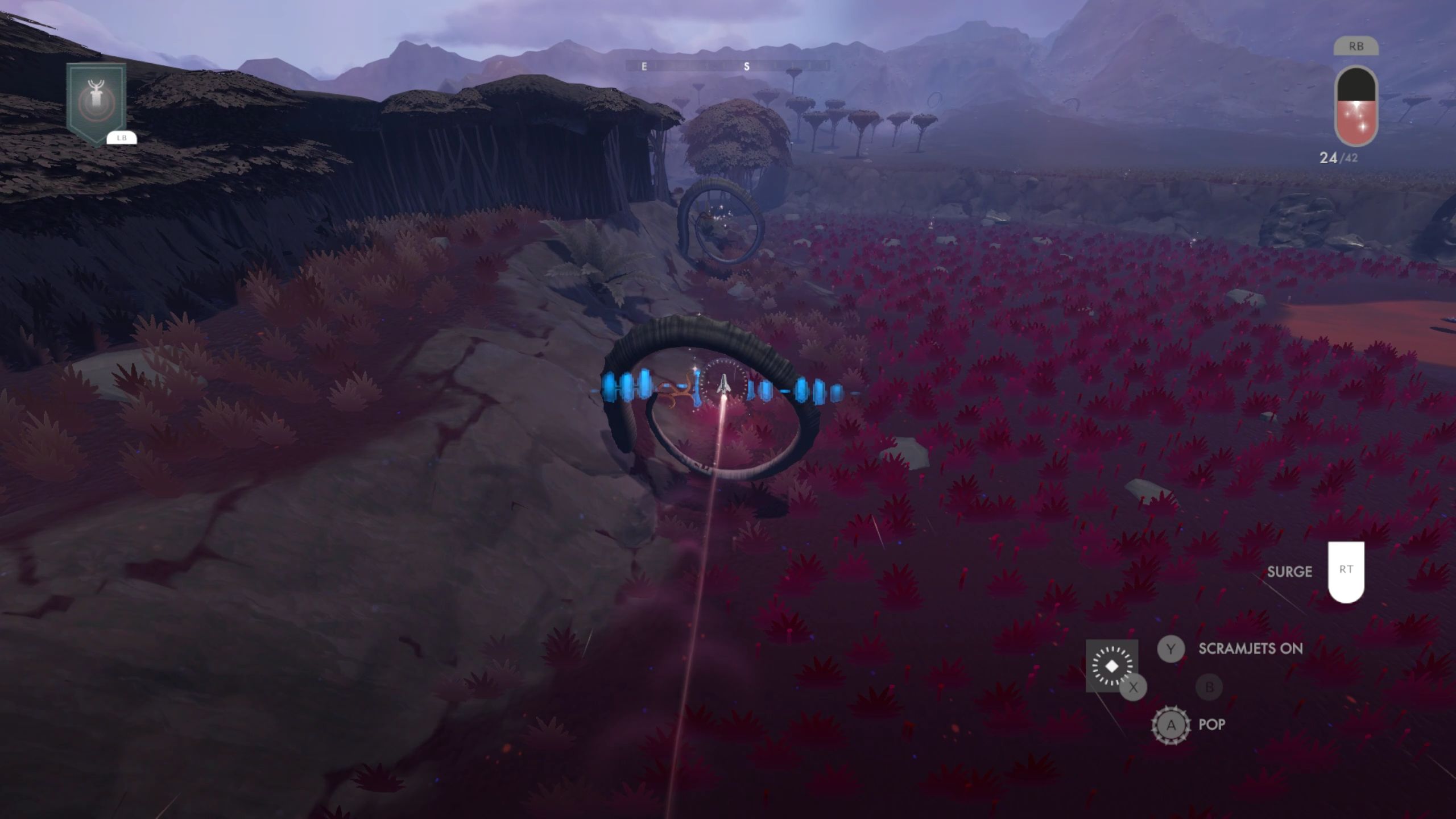Once there, the newcomers find confirmation of their wyldest dreams, but the planet soon turns against them. Equipment is damaged or taken by local fauna, and the weather pins the would-be explorers in place. Tor seems to at once welcome its guests and push them away, as if at odds with itself. Though the Hymnwave has hummed through the ether for many years, it’s clear the planet is not yet of one mind. It’s a backdrop that makes for a winning short science fiction story - one that resists the clichés of its genre and establishes a unique tone, in firm yet gentle fashion. But the conflict, sadly, isn’t limited to plot and themes. The game, too, is at war with itself. One part of Jett wants to be a tightly controlled, linear gallery of gorgeous vignettes. Another is interested, first and foremost, in becoming an experimental pool for playing with an alien ecosystem. Despite several years of development, the two haven’t settled their differences, and that tension is a near-constant source of discomfort throughout Jett’s 12-hour adventure. In your jett, at least, you’ll feel at peace. Steering your high-speed hovercraft over the undulating meadows and crags of The Far Shore is a genuine joy, thanks to a mixture of physics and visual effects that buoys and propels you. It’s the same rush a toddler gets when flanked by two adults, who pick them up by the arms and swing them forward with a “wheee!”. By default, you fly thrillingly close to the ground - but with a well-timed ‘pop’ of your engines can grab some serious air too, skimming your jett across a tree canopy or threading the needle along a narrow mountain range. Those engines soon overheat, and so maintaining top speed is a matter of gathering twinkling vapour, which is laid along implicit pathways through the landscape. In full flow, flight recalls Tiny Wings, Flower and OutRun all at once. The footage I’ve saved would make for a fantastic screensaver: hypnotic and daydreamy. As you’ll have noticed in the trailers, screenshots and Ed’s hands on preview that have preceded Jett’s release, its best trick is to pull the camera way back, sacrificing adrenaline for a contemplative, holistic view of your strange surroundings. It’s a choice that forefronts wonder - backed up by a superb soundtrack that swells in all the right places - and makes room on your screen for discovery. It’s here, in the periphery of your rocket-rambles, that the Shore’s ecosystem shines. Whenever you pass a giant plant, brightly coloured animal or unusual rock formation, you can scan it with a tap of a button and learn something. A bubbling ionic pool could restore your shields when approached, or stabilise a volatile substance. An electric snake might be attracted to your scramjets, causing you to turn them off. Or, rather, leave them on: tempting the serpent into a conductive bramble, which creates an explosion of flowers. In isolation, these qualities are mere curiosities. But you soon realise that they’re all catalysts, designed to change the rules or swap the palette of the surrounding world in delightful ways. This is the calling card of Randy Smith, Jett’s design and gameplay lead - best exemplified by his 2012 space-gardening game, Waking Mars. If you don’t know that, you’ll probably know his work on the Thief games - and there’s certainly something of the immersive sim in Jett’s creative interplay. But it’s not allowed to thrive. These undirected experiments are constantly undermined by scripted first-person sequences, which regularly ask you to ground your jet just as you’re beginning to set a pace of your own. It would be easier, in a way, if these story bits were simply rubbish - something you could happily skip through and bid terra firma adieu. But actually, they’re ill-fitting works of art. It starts with the shuttle launch that first takes you to the Far Shore, a moving montage of interlocking images that successfully serves a sharp cocktail of emotions - hope for the future, guilt for the “remnants” left behind, the giddy thrill of a long journey somewhere new. As the year counter ticks up, you’re acutely aware that the parents, village and planet you’ve left behind are crumbling to dust. “Those of us who remain will soon recover our sense of the unforgiving,” says dad. “Remember our love,” says mum. Even in scenes where you’re granted a semblance of direct control, you’re bumping up against walls - some visible, some not. It’s frustrating. But the trade-off for this tight choreography is some of the most extraordinary first-person imagery I’ve ever seen: industrial age chimneys turning the sky sepia; balloon animal grass swaying in an unbreathable wind; a colossal air-whale drifting past a porthole, indifferent to your awe. As Sword and Sworcery players will know, few can do symmetry, silhouette, and framing quite like Superbrothers. Annoyingly, for reviewers, Jett has already converted its visual beauty into exquisite prose, too. You’re accompanied by Isao, a fellow scout who commentates on events with a pleasing poeticism. A patch of beach becomes, through his eyes, “a stretch of mellow sandbars”. A spiky tree becomes a “ghastly spindle”. Before long, you’re lulled by Jett’s evocative language, which sits somewhere between encyclopedia and scripture. Tumult and torpor. Hymnwave and dreadwave. Ozu’s rose-tinted wilderness, and Ghoke’s dim glow. Only, the constant chatter gets in the way of your own thoughts. I reached my breaking point when a giant bird knocked our jett off a mountain perch, and Isao responded by narrating the event back to me. I know, mate, I was there! Show not tell! Over time, I came to resent the fact that the rituals of Jett’s crew, however charming, took precedence over those I might create for myself. I never set up a shelter that felt like my own, for instance, since my colleagues were always telling me exactly where to park my ship. Just once did I have enough room to meaningfully bring that emergent ecosystem to bear on Jett’s prescriptive plot. As Isao and I pursued an angry colossus, I ‘spiced’ my vapour trail with sedative seeds from a nearby shrub - then flew the jett like a crop duster over the beast to send it to sleep, before yanking a missing piece of equipment from its flank. I get the feeling that Jett could have been full of moments like that, if only its creators had loosened their grip more frequently, and for longer. But alas, bugs only exacerbate the sense of freedom curtailed. One prevented essential resin from spawning that made a sequence unfinishable until I rebooted the game; another saw Isao pause in uncharacteristic, eternal silence during a mandatory conversation. It’s testament to Jett’s great strengths that, in the language of the scouts, I adapted and persevered through its severe lows. Once the story finished, I hoped an endgame would open up and allow me to play freely in its world. That I’d have more opportunities to watch great Ghoke, the red sun, rise in real time, and to ponder the Far Shore’s fascinating mysteries at length. Instead, I could only replay previous chapters. If only Jett had embraced a rhythm as organic as its inspired ecosystem.



